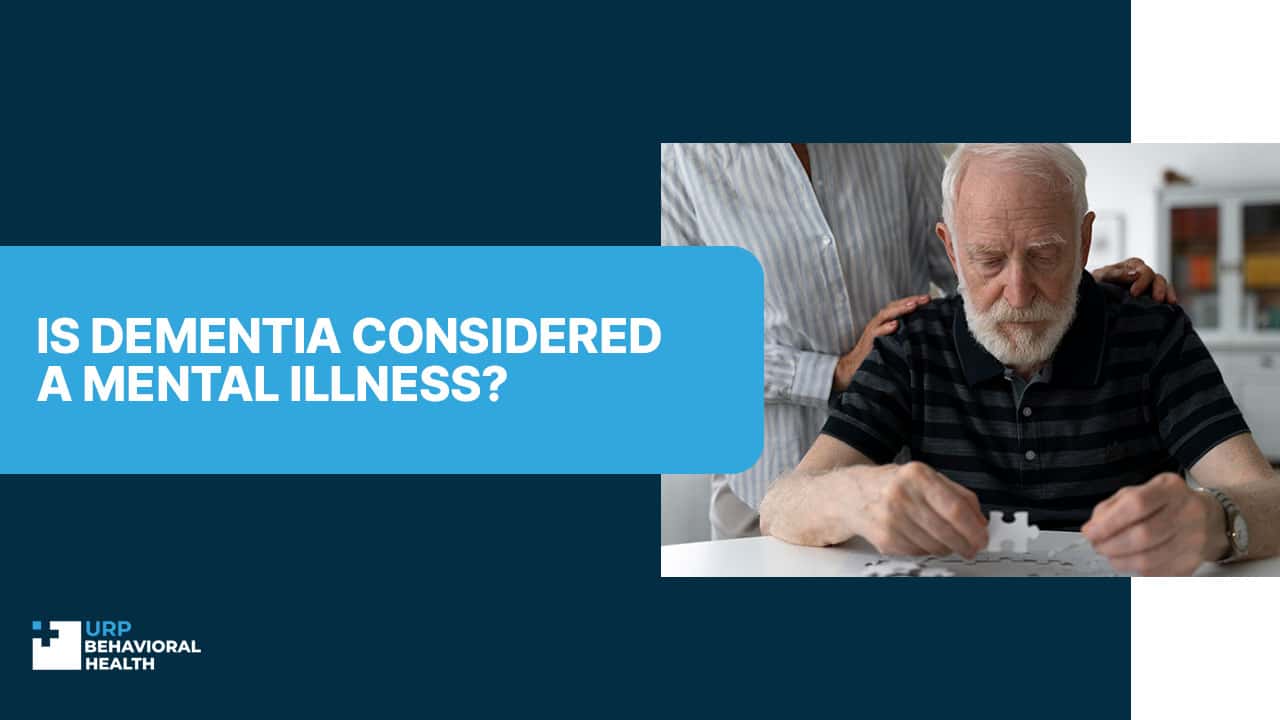
Is Dementia Considered a Mental Illness?
Dementia is a complex of symptoms that denote a loss of ability to perform daily tasks independently and it gradually worsens over time. While a disease is a well-defined condition, dementia refers to a group of illnesses, neurologic, psychiatric, and medical.
Alzheimer’s disease, which is neurodegenerative dementia, is more prevalent in the elderly population. In contrast, head injury or brain tumor cause dementia in the young population.
Despite notable progress in molecular neuroimaging and the identification of new biomarkers, there is no curative treatment for neurodegenerative dementias to date. Doctors from various disciplines are focusing on patient comfort, treating co-morbid illnesses, and enhancing the patient’s and family’s well-being [6].
Is Dementia a Disease or a Psychiatric Disorder?
Dementia represents thus an outstanding and multifarious illness that is linked to psychiatric symptoms but is not an illness of a psychiatric degree. Severe mental and physical comorbidities related to the brain amongst affected patients were evident in the 21 patients diagnosed with dementia or a cognitive disorder in a forensic psychiatric study.
The underlying factors included cerebrovascular disorders, alcohol or drug abuse, head injury, and neurological diseases including Alzheimer’s disease. A considerable number of these people suffer from dementia. Alcohol abuse was the issue most closely linked to confusion in most patients.
The offenses investigated, of which 38 were identified, were opportunistic and, for the most part, involved violence but were not premeditated. When particularly severely symptomatic and when involving criminal acts were present care or rehabilitation was advised instead of imprisonment. It is well known that dementia frequently involves psychiatric symptoms such as delusional disorders or psychosis; none of the patients enrolled in the study were mental health patients diagnosed as having a personality disorder [7].
Contact our admissions team now to begin your path toward a brighter future.
Is Dementia a Mental Disorder in the Eyes of the NHS?
To a lay reader, the term “dementia” from an NHS point of view refers to a range of conditions that are associated with the brain. Dementia as identified by the Alzheimer’s Society encompasses over one hundred subtypes and types of the illness. These conditions cause a progressive deterioration in human faculties namely Short Term Memory, Object and Spatial Relations, Executive Abilities, and Language.
Common problems include getting easily confused, being frustrated, or even frightened because you cannot remember what happened or what was said only a short while ago and this leads to recounting previous stories or questions. Prejudicial feelings about dementia like the idea of a progressive decline in ability or the notion that there is no help for the condition, are detrimental to patient health. These attitudes make life with dementia less desirable [5].
Similarities Between Dementia and Mental Illness
Dementia and mental illness often have similar symptoms, which can lead to confusion:
- Both conditions can bring with them Bavarian associations of mood and behavior that are distressing for sufferers and their loved ones. For example, dementia is often associated with depression and anxiety disorders, which are more severe features of many mental illnesses.
- Many mental illnesses can produce symptoms similar to dementia, including behavioral disturbances. Either condition may be accompanied by a series of symptoms including hopelessness, loss of interest, agitation, restlessness, delusions, and hallucinations. Dementia and other mental disorders share many overlapping symptoms, meaning family members may not know if the person is experiencing dementia or some other mental disorder [4].
We’ll help you understand your options and guide you toward care.
Differences Between Dementia and Mental Illness
Dementia impairs mental well-being, it is not seen as a mental illness in the classical sense. Dementia is a neurological disorder characterized by memory loss and communication difficulties. While dementia develops slowly and depends on the speed of the particular form of dementia, mental illnesses such as depression are usually sudden.
A fundamental difference in the disease is therefore in its type and course. Many mental illnesses, such as schizophrenia or depression, manifest themselves with symptoms in the area of emotions, such as loss of joy, hope, failure, and fear, which occur relatively easily and are worth treating. Dementia lies in this area and leads to the loss of primary cognitive functions over a longer period.
The course and recognition differ significantly. Mental health disorders such as depression and anxiety often develop before the age of 25 and are treated early, whereas dementia is usually only specified later in life because the first signs such as memory loss and confusion tend to be simply dismissed as normal symptoms of old age.
Clinical symptoms progress differently in patients with Alzheimer’s and other forms of dementia and often appear with mental illness, such as severe mood swings and behavioral abnormalities. Depression in dementia patients accelerates the progression of cognitive impairment and promotes the development of severe dementia. Mentally ill people do not necessarily show signs of dementia, but psychiatric symptoms greatly exacerbate the course of dementia [1].
Symptoms of Dementia, Mental Illness
Mental illnesses generally can be treated quite well, but if you also have dementia, the same treatments do not always work. Treatments you might use for mental health conditions can sometimes make dementia worse in older adults with dementia, while older adults with dementia respond slightly differently to medications. While health care guidelines recommend avoiding regular use of antipsychotic drugs, such as those used to treat psychological and behavioral symptoms, they can increase a fall risk or accelerate cognitive decline.
Mental illness also can be particularly difficult to diagnose in people who have dementia as the symptoms may be similar. Depression, anxiety, or agitation can either be associated with a mental health condition or the progression of dementia itself, so it is difficult for healthcare professionals to know the difference.
While some medications may still work, there have been promising nonpharmaceutical approaches and changes in lifestyle, including physical activity and social connection, that have resulted in improved health as well as quality of life for those with dementia [2].
Conclusion
Alzheimer’s disease and related dementias affect people in the early stages when thinking, memory, and reasoning change enough to impact a person’s daily life. As the disease advances they may need more support with simple things like bathing, dressing, and grooming. They can be very distressed with needing help on such personal activities:
- Establish a routine. Keep a regular daily bath, dress, and eat schedule for the sake of consistency.
- Use to-do lists. Write down tasks, appointments, and events that you can help your loved one keep up with by giving him a notebook or a calendar.
- Plan enjoyable activities. Arrange what your loved one enjoys doing and try to do all of these at the same time each day to create familiarity.
- Medication reminders. Set up a reminder system for medications that you have to take at a regular interval.
- Encourage independence. Promoting independence when your loved one is dressing or bathing, allow as much as you can.
- Choose appropriate clothing. Choose comfortable clothing to wear that isn’t fastened at the waist like having elastic waistbands, fabric fasteners or big zipper pulls rather than shoelaces, buttons, or buckles.
- Provide supportive equipment. Give bulky shower chairs to those who are not stable on their feet, so that they don’t fall. You can buy these at drug stores and medical supply stores.
- Communicate gently. When helping with dressing or bathing, be gentle and respectful. Tell them and explain every step.
- Create a familiar dining environment: Aside from eating, serve meals in a consistent, familiar setting and give your loved one plenty of time to eat [4].
The quality of life for patients with dementia and individuals with mental illness depends on treatment that is individualized. Such a plan encourages a partnership between the patient and their caregivers to learn about the symptoms of dementia, psychiatric diseases, and the interventions that can be used to manage it well. This holistic approach isn’t just for this condition, it deals with this one while making the lives of victims of these conditions better in general [3].
If you struggle with behavioral health issues, remember that you are not alone. Seeking help from the URP Behavioral Health is a vital step towards healing and improvement. It’s essential to take your feelings seriously and reach out for support, whether through therapy, medication, or community resources.
Our professional help can provide guidance, coping strategies, and a safe space to express your thoughts and feelings. Don’t hesitate to reach out to a mental health provider, counselor, or support group. Taking the first step can lead to a healthier, more fulfilling life. You deserve support and assistance on this journey to better mental health!
Our team will verify your insurance and design a plan tailored to your needs.
References:
- Abney and Baker. (n.d.). Dementia or mental illness? Retrieved from https://abneyandbaker.com/blog/dementia-or-mental-illness/
- Alzheimer Society of Canada. (n.d.). Let’s talk about dementia, mental illness, mental health. Retrieved from https://alzheimer.ca/en/whats-happening/news/lets-talk-about-dementia-mental-illness-mental-health
- Alzheimer’s.gov. (n.d.). Tips for caregivers. Retrieved from https://www.alzheimers.gov/life-with-dementia/tips-caregivers
- (n.d.). Is dementia a mental illness? Similarities and differences between the two. Retrieved from https://www.buzzrx.com/blog/is-dementia-a-mental-illness-similarities-and-differences-between-the-two
- Healthcare Education England. (2018). Standard 9: Awareness of mental health, dementia, and learning disabilities.Retrieved from https://www.hee.nhs.uk/sites/default/files/documents/Standard-9%20Awareness%20of%20mental%20health%2C%20Dementia%2C%20and%20learning%20disabilities.pdf
- Park, L. T., & Zarit, S. H. (2018). The relationship between mental illness and dementia: A comprehensive review. https://pubmed.ncbi.nlm.nih.gov/29425707/
- Park, L. T., & Zarit, S. H. (2017). Mental illness and dementia: A review of similarities and differences. https://pubmed.ncbi.nlm.nih.gov/28923026/
















